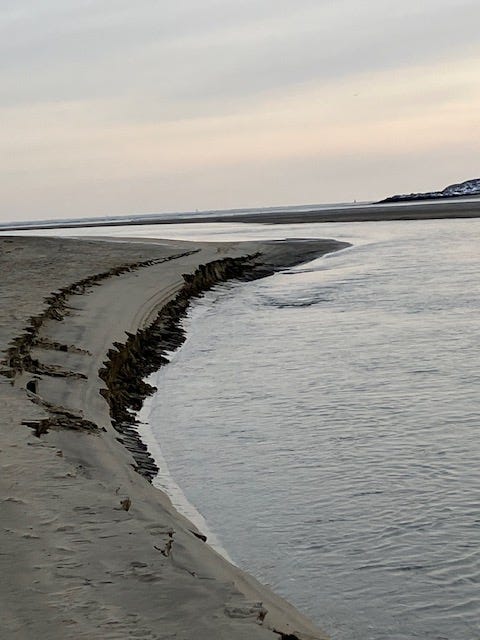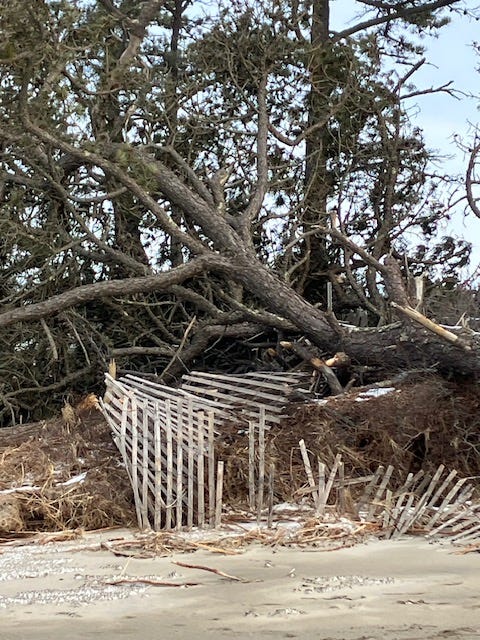Torn From a Once Safe Place
January 21, 2024
First the floods came. Then Iowa where the Republican party surrendered to a mad man. Then I got very afraid. This week two violent storms passed through this place called home, one atmospheric, one political. With these two events, shadowed as they are by the Israeli-Palestinian tragedy, my dear old mind has come unmoored. I feel fractured and unsafe. And very sad. Shaped in the last century by a different set of beliefs about our country and our future, my mind is desperately trying to make sense of what is happening. I am like the fishing shacks and the wooden stairs down to the dunes: torn by the violence of the wind and tides from their once safe place beside the sea, pushed about by strange currents and cold winds.


“I never thought it would end this way.” I mutter when Bob and I walk Popham Beach State Park on Friday and see the sand dunes washed out to sea and the trees thrown up like some monster had come by and, in a moment of glee, tossed the whole place into ruins. I mutter it when I read about the destruction to fishing infrastructure up and down the coast and, too, when I read about Jamie Dimon, at JP Morgan Chase, throwing his support at the feet of that madman.
“God said I need somebody willing to get up before dawn, fix this country, work all day, fight the Marxists, eat supper, then go to the Oval Office and stay past midnight at a meeting of the heads of state. So God made Trump,” declares the voiceover on the video Trump posted to Truth Social on the eve of the Iowa caucus.
Trump understands fear, my fear, yours. He thrives on our fears like bees thrive on pollen. He understands things are falling apart and many of us are adrift. There’s nothing like rage as an antidote to fear. Rage and being chosen by God. Like a man mining for gold, Trump’s always sifting for the purple quiver of fear he can wrap up in garbled gibberish and use to inflate himself into a savior.
Like a child who senses her Mother’s grave illness but is unable to articulate it, I dare to say that the heat, the storms, the droughts, the floods, the changing seasons, the disappearance of birds and insects and plant species are noted by our basic evolutionary senses, but our minds have been so manipulated by the culture of power and consumerism that we are unable to identify the real source of this fear: the rapid depletion and destruction of earth’s ecosystems as a result of the mind-spinning progress of the last fifty years.
Iowa is a farm state. Hogs, cattle, milk, chicken, eggs, corn, soybeans: Iowa grows it all. The farmers are acutely connected to land. They know the temperatures are warming, droughts are increasing as are floods. Unwanted insects are flourishing, soil erosion is increasing.
They know their Mother is ill and their family will have to face many difficult changes, but as it is for any child, this reality is difficult to face, so, understandably, they turn to the Big Man with the Red Hat who will save them and defend them by any means against the monsters knocking at the door.
These monsters are very scary and 2024 will be a year when the monsters howl. Get ready.
I began this third winter season writing Code Red by addressing the fact that Mother Earth is very ill and dying and if there is any chance to save her, we need to rewire our brains to be able to experience our interconnection to all things in the natural world and birth our love for all those things. I am not a scientist, or an economist or a researcher. But I am a student of the human mind and try to understand this moment from that point of view.
But all that fierce writing about rewiring our brains by talking to robins and hugging trees and listening to Grandmother Woodchuck sometimes makes me feel, well, honestly, like a slightly mad, rather eccentric tree-hugger. It was this slightly mad, eccentric tree-hugger who felt so adrift this week, so overpowered by the forces of destruction loosed in the world. She was a tree-hugger lost in a swirling sea without a good paddle to steer her in the right direction. When I am lost at sea, I read. Words and ideas are my landmarks for the way forward. A piece in Science Progress: Sage Journals I came upon late in the week shored me up and sent me back to land with a bit more courage and direction.
Eleven world scientists put out a paper four months ago that asserts that unless we address “the Human Behavioral Crisis of our maladaptive behavior…even in the best-case scenarios, symptom-level interventions are unlikely to avoid catastrophe or achieve more than ephemeral progress.” By symptom-level the authors mean that focusing on lowering carbon emissions through infrastructure change like electrifying everything won’t break the connection wired into our brains between self-worth, security, excitement, belonging and buying stuff. The manipulation of these needs, the paper asserts, has caused us to overshoot our planetary capacity to support the population by almost one whole earth. In other words, to maintain the current production capacity we need 1.7 earths. Unless demand for resources is reduced, technological innovations will be what the Guardian calls ‘sticking plaster.’
Ah! Now we are in my realm. The authors of this paper encourage practitioners in the field like me whom they describe as “demonstrated masters in the theory of driving behavior change but crucially also masters of the practical implementation of that theory in the real world,” to join with other disciplines and come forward and speak out.
The work we do at FreeportCAN is largely directed at these kinds of behavioral changes. Eat more plants, buy recycled clothing, consider active transportation, rewild your yard. But it has been a long slog and, truthfully, while people pat us on the back and say good work, I don’t see a lot of enthusiasm for the kinds of changes we are promoting. People with means are willing to buy a heat pump or put solar on their roofs or buy an electric car. But those actions don’t address behavior change. Life can still go on without any big adjustments.
Why is this kind of progress so hard? It would be all too easy to say it is because people are basically selfish and don’t want to be inconvenienced. Or that they don’t care enough. Or that it’s all too hard and so they slip into denial.
But the paper by Joseph Merz and his colleagues (which I urge all of you to read) presents another explanation, one that is based on behavioral science and rings so true that I don’t know why I haven’t seriously considered this before. The enemy is not us and our insatiable needs. The enemy is Sigmund Freud’s nephew, Edward Bernays. That’s right. It’s back to Freud again. Bernays is regarded as one of the founders of the public relations industry, otherwise known as marketing. Bernays ransacked his uncle’s theories to develop techniques for widespread behavioral manipulation which he called The Engineering of Consent. Marketing.
With the birth of marketing, business growth was pushed not by biological requirements for warmth or food or shelter, but for things like status, rebellion, appetite for adventure! We are now hard-wired to buy things to claim our social niche, to boost our mood, establish our identity or, a nod to you Sigmund, to look sexy. We are so hard-wired to make decisions based on these prompts called signaling, that we think of them as ‘human nature,’ rather than ‘engineered consent.’
“People are the victims – we have been exploited to the point we are in crisis. These tools are being used to drive us to extinction,” says the evolutionary behavioral ecologist and study co-author Phoebe Barnard. “Why not use them to build a genuinely sustainable world?”
So we at FreeportCAN need to become marketing gurus! We need to make the person who lives in a tiny home, wears repurposed clothing, eats a plant-based diet, decorates with second-hand rugs, flies only once or twice a year, so cool, so 2024 hip, so high-status, so sexy, so admirable that that others in town will follow suit and before you know it we will have reached the tipping point of 25% of the population, a number which represents a catalytic threshold for further widespread adoption of a new behavior.
Again I will ask you, reader, for help. If any of you have a marketing or social science background and would like to help with this endeavor, please reach out. And if you see a particularly persuasive marketing scheme which you think could help us build a more sustainable world, send it on!
Now I will follow the directive of the authors of that paper and speak out about a marketing plan so brilliant, so engineered for consent that anytime I go uptown I

observe people from all over the world roaming the campus of LLBean in a trance of reverence. They paw over the plaid flannel shirts sewn somewhere in Asia, sigh at the sight of the giant iconic Bean boot planted outside the entrance as if it were the very shoe worn by Daniel Boone or LL himself. Be an Outsider is the brilliant marketing logo of this company. Click that dirty City Bank credit card, buy that flannel shirt you don’t need or those flannel sheets and you are instantly transformed back to a time when the forests weren’t threatened by clearcutting, when the hemlock weren’t infested with wooly adelgid, when the lakes were clear and the ocean cold. Oh! and when all life on the planet wasn’t threatened with extinction by overconsumption shaped by advertising. Beans never talks about climate change or the degradation of nature because they are selling Nature, pure, untouched, sweet, balsam-smelling Nature.
You don’t even have to go outside to Be an Outsider! You just have to BUY something.
I can’t say why this paper and these considerations help me feel less lost. Maybe it’s because I can point to a better enemy than my own selfish mind: marketing, otherwise known as widespread behavioral manipulation. Maybe knowing how skilled these marketers are at wiring my brain makes me feel less bad about having gotten it all wrong for so many years. Maybe I have hope that we can turn the forces of marketing towards shaping our behavior in ways that will prevent us from planetary catastrophe.
And as for that mad man, well he’s right. Anger is a great defense against fear. And anger is a great motivator. I am going to fight like hell all year and do everything in my power to defeat him.
I leave you with the last stanza of a poem which has been running around in my head all week.
For the Children
by Gary Snyder
stay together
learn the flowers
go light


I love eccentric tree-hugging, anti RedHat, pro-environment, good people. When things start spinning apart in chaos be it climate driven or by politics, the center must hold in the tempests. Good people are that center. You, Freeport-CAN as well. Keep on fighting. Do not go gentle into those winds.
The paper by Joseph Merz and colleagues you reference is excellent. It offers a believable path for survival.